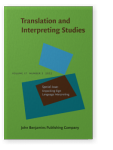Introduction
Unpacking sign language interpreting as a social institution
The missing macro perspective?
References (38)
References
Baker Shenk, Charlotte. 1986. “Characteristics
of oppressed and oppressor peoples.” In Interpreting: The art of
cross-cultural mediation, ed. by Marina L. McIntire, 43–53. Silver Spring, MD: RID Publications.
Best, Brett. 2019. “Is
it time to accredit interpreting agencies?: Perspectives of BSL-English interpreters.” Journal
of Interpretation 27(1): article
1.
Blankmeyer Burke, Teresa. 2017. “Choosing
accommodations: Signed language interpreting and the absence of choice.” Kennedy Institute of
Ethics
Journal 27(2): 267–299. 

Bienvenu, M. J. 1987. “Third
culture: Working together.” Journal of
Interpretation 41: 1–12.
Brunson, Jeremy L. 2007. “Your case will now be heard:
Sign language interpreters as problematic accommodations in legal interactions.” The Journal of
Deaf Studies and Deaf
Education 13(1): 77–91. 

Brunson, Jeremy L. 2015. “A sociology of interpreting.“ In Signed Language Interpretation and Translation Research, ed. by Brenda Nicodemus and Keith Cagle, 130–149. Washington, DC: Gallaudet University Press. 

Caselli, Naomi. K., Wyatt C. Hall, and Jon Henner. 2020. “American
Sign Language interpreters in public schools: An illusion of inclusion that perpetuates language
deprivation.” Maternal Child Health
Journal 241: 1323–1329. 

Cokely, Dennis. 2005. “Shifting
positionality: A critical examination of the turning point in the relationship of interpreters and the Deaf
community.” In Sign Language Interpreting and Interpreter Education.
Directions for Research and Practice, ed. by Marc Marschark, Rico Peterson, and Elizabeth A. Winston, 3–28. New York: Oxford University Press. 

Corker, Mairian. 1997. “Deaf
people and interpreting: The struggle in language.” Deaf
Worlds 13(3): 13–20.
Darroch, Emma. 2018. “An
illusion of inclusion? – Can counselling psychology do more to ensure equality and access to psychological therapies for deaf
people, through their work with interpreters?” The European Journal of Counselling
Psychology 7(1): 14–30. 

De Meulder, Maartje, Jemina Napier, and Christopher Stone. 2018. “Designated
or preferred? A presentation of best practice of a deaf academic and two signed language interpreters working together for a
PhD defense.” International Journal of Interpreter
Education 10(2): 5–26.
Hall, Wyatt, Thomas Holcomb, and Marlene Elliott. 2016. “Using
popular education with the oppressor class: Suggestions for sign language interpreter
education.” Critical
Education 7(13). 

Haualand, Hilde. 2014. “Video
interpreting services: Calls for inclusion or redialling
exclusion?” Ethnos 79(2): 287–305. 

Holcomb, Thomas, and David Smith, eds. 2019. Deaf
Eyes on Interpreting. Washington, DC: Gallaudet University Press.
Kaplunov, Elizabeth. 2019. Towards
better health communication among deaf people: A mixed methods approach to understanding the feasibility and efficacy of a
novel m-health videoconferencing tool. Unpublished doctoral
dissertation, Department of Health, University of Bath.
Kusters, Annelies, Maartje De Meulder, and Dai O’Brien, eds. 2017. Innovations
in Deaf Studies: The Role of Deaf Scholars. New York: Oxford University Press.
Llewellyn Jones, Peter, and Robert G. Lee. 2014. Redefining
the Role of the Community Interpreter: The Concept of Role-space. Lincoln, UK: SLI Press.
McDade, Rita. 1995. “What
can interpreters learn from professional footballers?” Paper presented at
Issues in Interpreting 2, University of
Durham, September, 1995.
Mellinger, Christopher D. 2020. “Positionality in public service interpreting research.” FITISPos International Journal 7(1): 92–109. 

Napier, Jemina. 2011. “‘It’s
not what they say but the way they say it.’ A content analysis of interpreter and consumer perceptions of signed language
interpreting in Australia.” International Journal of the Sociology of
Language 2071: 59–87. 

Nicodemus, Brenda, Janis Cole, and Laurie Swabey. 2021. “Storied
classrooms: Narrative pedagogy in American Sign Language–English interpreter
education.” International Journal of Interpreter
Education 7(2): article
6.
O’Brien, Dai, Gab Hodge, Kate Rowley, Robert Adam, Sannah Gulamani, Steve Emery, and John Walker. (in
preparation). Deaf professionals’ perceptions of trust in relationships with signed/spoken
language interpreters.
Phillip, Marie-Jean. 1994. “Professionalism:
From which cultural perspective?” Paper presented at the Issues in
Interpreting conference, University of Durham, April, 1994.
Robinson, Octavian, Naomi Sheneman, and Jon Henner. 2019. “Toxic
ableism among interpreters: Impeding deaf people’s linguistic rights through pathological
posturing.” In Honouring the Past, Treasuring the Present, Shaping
the Future: Conference Proceedings of the World Association of Sign Language Interpreters, ed.
by Campbell McDermid, Suzanne Ehrlich, and Ashley Gentry, 14–41. Paris: WASLI.
Roy, Cynthia B. 1989. A sociolinguistic analysis of
the interpreter’s role in the turn exchanges of an interpreted event. Unpublished Ph.D.
dissertation. Georgetown University, Washington, DC.
Roy, Cynthia B. 2000. Interpreting as a Discourse
Process. New York: Oxford University Press.
Roy, Cynthia B., Jeremy L. Brunson, and Christopher Stone. 2018. Academic
Foundations of Interpreting Studies. Washington, DC: Gallaudet University Press. 

Russell, Debra. 2007. “Inclusion
or the illusion of inclusion: A study of interpreters working with deaf students in inclusive education
settings.” Presentation given at the
Critical Link 5:
Interpreters in the Community Conference
, Sydney,
Australia, 12–14 April 2007.
Russell, Debra, and Elizabeth B. Winston. 2014. “Tapping
into the interpreting process: Using participant reports to inform the interpreting process in educational
settings.” Translation &
Interpreting 6(1): 102–127. 

Sheneman, Naomi. 2016. “Deaf
interpreters’ ethics: Reflections on training and decision-making.” Journal of
Interpretation 25(1): 1–21.
Skaaden, Hanne. 2019. “Ethics
and profession.” In Ethics in public service
interpreting, ed. by Mary Phelan, Mette Rudvin, Hanne Skaaden, and Patrick Kermit, 147–201. London: Routledge. 

Sommer Lindsay, Mette. 2020. “Deaf
people’s coping strategies in an everyday employment context.” Deaf Studies Digital
Journal 51. 

Stone, Christopher, Robert Adam, Ronice Müller de Quadros, and Christian Rathmann, eds. 2022. The
Routledge Handbook of Sign Language Translation and
Interpreting. London: Routledge. 

Cited by (1)
Cited by one other publication
Napier, Jemina
2023.
Book review: The Routledge Handbook of Sign Language Translation and Interpreting.
Interpreting and Society 3:2
► pp. 195 ff.

This list is based on CrossRef data as of 5 july 2024. Please note that it may not be complete. Sources presented here have been supplied by the respective publishers.
Any errors therein should be reported to them.
